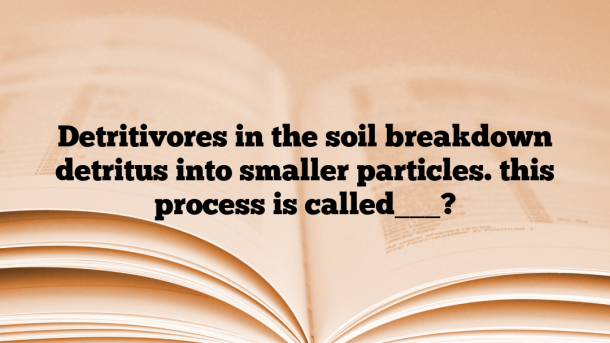Detritivores in the soil breakdown detritus into smaller particles. this process is called___?
In the intricate tapestry of ecosystems, soil stands as a foundation, teeming with life and intricate processes that sustain all terrestrial life forms. At the heart of soil dynamics lie detritivores, humble yet indispensable organisms that play a crucial role in breaking down organic matter, a process essential for nutrient cycling and ecosystem balance. As they diligently work through the detritus, they engage in a process known as decomposition.
The Essence of Detritivores in Soil Ecosystems
Detritivores, ranging from earthworms to springtails, and myriad microorganisms, serve as the unsung heroes of soil ecology. Their primary task is to break down complex organic matter, such as dead plants and animals, into smaller particles, thereby initiating the process of decomposition. Through their relentless efforts, detritivores facilitate the release of vital nutrients locked within organic materials, making them available for plant uptake and sustaining the entire ecosystem’s productivity.
The Journey of Detritus: From Organic Matter to Nutrient Rich Soil
Detritivores embark on a journey that begins with the arrival of detritus on the soil surface. Leaves fall, branches break, and organisms die, leaving behind a rich tapestry of organic matter. As detritivores descend upon this bounty, they initiate a cascade of biological processes that transform this organic matter into a form that the soil and its inhabitants can utilize.
Decomposition: Unraveling the Mysteries of Detritus Breakdown
At the heart of detritivore activity lies the intricate process of decomposition. This process involves the physical, chemical, and biological transformation of complex organic matter into simpler compounds. Detritivores, along with a myriad of microbial allies, catalyze this transformation through a series of coordinated actions.
The Role of Detritivores in Decomposition
Detritivores employ various mechanisms to break down organic matter. Macro-detritivores such as earthworms and millipedes physically shred detritus into smaller fragments, increasing its surface area and facilitating microbial colonization. These organisms also ingest organic matter, initiating a process of internal digestion that further breaks down complex compounds into simpler forms.
Micro-detritivores, on the other hand, operate on a microscopic scale, with bacteria, fungi, and protozoa being the primary agents of decomposition. These organisms produce a vast array of enzymes capable of degrading complex carbohydrates, proteins, and lipids present in detritus. By secreting enzymes into their environment, micro-detritivores catalyze biochemical reactions that cleave complex molecules into smaller, more manageable compounds.
The Significance of Detritivore Diversity
Diversity among detritivores is paramount to the efficiency and resilience of decomposition processes. Different species possess unique adaptations and preferences, allowing them to thrive in various ecological niches and consume a wide range of organic materials. This diversity ensures that detritus breakdown remains robust and resilient in the face of environmental fluctuations and disturbances.
Detritivores as Ecosystem Engineers
Beyond their role in decomposition, detritivores also serve as ecosystem engineers, actively shaping their environment and influencing soil structure and fertility. Earthworms, for instance, tunnel through the soil, aerating and mixing it, while also creating channels for water infiltration and root growth. These activities enhance soil porosity, promote nutrient cycling, and foster conditions conducive to plant growth.
The Importance of Detritivores in Nutrient Cycling
Detritivores play a pivotal role in nutrient cycling, facilitating the movement of essential elements through the soil ecosystem. As they consume organic matter, detritivores assimilate nutrients into their bodies, some of which are released back into the soil through excretion or upon their eventual demise. This continuous flux of nutrients sustains soil fertility, supporting plant growth and productivity.
Challenges Facing Detritivores in Modern Ecosystems
Despite their critical importance, detritivores face numerous challenges in modern ecosystems, many of which stem from human activities. Habitat loss, pollution, climate change, and invasive species pose significant threats to detritivore populations, disrupting essential ecosystem processes and compromising soil health.
Conservation and Management of Detritivore Communities
Efforts to conserve and manage detritivore communities are essential for maintaining soil health and ecosystem function. Conservation strategies may include habitat restoration, reduction of chemical inputs, promotion of organic farming practices, and fostering awareness about the importance of detritivores in soil ecosystems.
Conclusion: Nurturing the Guardians of Soil Health
In the intricate web of life that encompasses terrestrial ecosystems, detritivores stand as guardians of soil health and vitality. Through their tireless efforts, these humble organisms facilitate the breakdown of detritus, enriching the soil with essential nutrients and sustaining the intricate balance of life. As stewards of the land, it is our responsibility to recognize and protect the invaluable services provided by detritivores, ensuring the health and resilience of soil ecosystems for generations to come.



